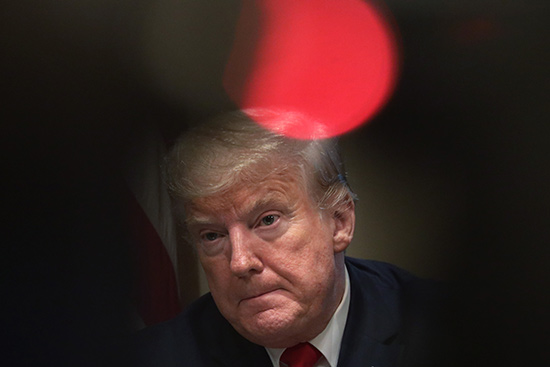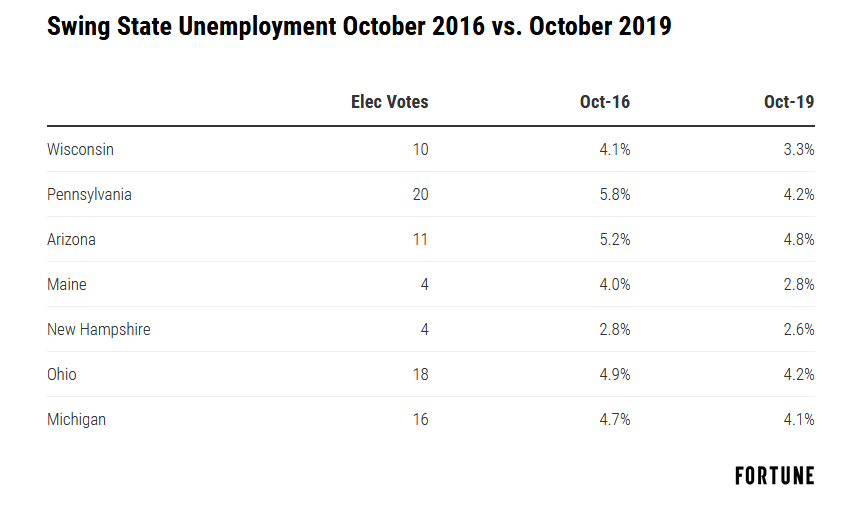這幾個搖擺州的經(jīng)濟(jì)形勢或?qū)Q定特朗普能否連任

|
特朗普的選情樂觀嗎,?這不是一兩句話能夠說得清的,。 在2020年總統(tǒng)大選期間,美國有7個州大概會成為“搖擺州”,,說起這些州的經(jīng)濟(jì)情況,,有一些好消息,也有一些壞消息,。至于它們的經(jīng)濟(jì)情況是否會對大選產(chǎn)生影響,,留給我們的問題遠(yuǎn)比答案多。三個月前,,《財(cái)富》雜志對這7個搖擺州的經(jīng)濟(jì)數(shù)據(jù)進(jìn)行了研究,。最近,我們又根據(jù)最新數(shù)據(jù)再次進(jìn)行了分析,。根據(jù)美國的選舉制度,,總統(tǒng)候選人至少要獲得270張選舉人票才能夠當(dāng)選,而這7個州占了83張選舉人票,。要說2016年的故事教會了我們什么,,那就是美國總統(tǒng)并不是全國老百姓普選出來的,真正在大選中起決定作用的,,恰恰是這些搖擺州的倒向,。(克林頓的智囊詹姆斯·卡維爾當(dāng)年在輔佐克林頓競選時,曾經(jīng)發(fā)出過一句振聾發(fā)聵之語:“笨蛋,,最重要的是經(jīng)濟(jì),。”) 我們對研究的數(shù)據(jù)進(jìn)行了更新,,包括實(shí)際GDP(這里采用的是第二季度的數(shù)據(jù),,因?yàn)楦髦莸牡谌径葦?shù)據(jù)還需要一些時間才能出來,所以目前無法獲得),、失業(yè)率(10月數(shù)據(jù))和個人收入增長率(第二季度數(shù)據(jù))等,。我們把這些數(shù)據(jù)與2016年大選剛剛開始時做了一番對比,以觀察人們的經(jīng)濟(jì)狀況是否有所改善,。三個月前,,我們發(fā)現(xiàn)除了亞利桑那州之外,所有搖擺州的經(jīng)濟(jì)增長率都比2016年慢,。這次對數(shù)據(jù)更新后,,我們發(fā)現(xiàn),,這種趨勢還在持續(xù)。 |
It’s a mixed picture. When it comes to economic conditions in seven likely 2020 swing states, there’s some bad news, some good news, and more questions than answers about how the economy in those states may swing the election. Three months ago Fortune looked at the economic numbers in seven swing states, and with new data available we ran the numbers again. These states account for 83 electoral votes toward the required 270 to win, and if we learned anything in 2016 it’s that the popular vote doesn’t elect the president, it’s the swing states, stupid. (Thank you, James Carville.) We’ve updated the data with the latest numbers available, including real GDP from the 2nd quarter (3rd quarter data takes longer to compile at the state level and is not yet available), as well as the aforementioned unemployment rates (October) and personal income growth (2nd quarter). We compared those numbers with the conditions back when the election took place in 2016, in an effort to see if people are better off economically. Three months ago we saw slower growth than in 2016 in all swing states but one (Arizona), and this time, the trend continues. |

|
Leuthold Group的首席投資策略師吉姆·保爾森表示:“我認(rèn)為,,把這次選舉與上次選舉進(jìn)行比較沒有太大意義,。當(dāng)下最值得關(guān)注的是,最近幾個季度的數(shù)據(jù)跟之前相比是否變?nèi)趿??!倍鴱?019年一季度到二季度,美國的總體經(jīng)濟(jì)增長率仍然在持續(xù)放緩,。 |
“I think the comparison to the last election is not that relevant,” says Jim Paulsen, Chief Investment Strategist of The Leuthold Group. “I think what matters most is whether data is getting weaker in recent quarters or not compared to what it was earlier.” That view shows the overall U.S. economy continuing to slow from the 1st quarter to the 2nd quarter of 2019. |

|
弗吉尼亞大學(xué)政治中心創(chuàng)始人,、主任拉里·薩巴托則認(rèn)為,與克林頓時代相比,,現(xiàn)在的美國,,經(jīng)濟(jì)問題已經(jīng)不再是決定誰能夠勝選的主要因素?!艾F(xiàn)在要想讓一個選民改變他的黨派傾向是很難的,,造成這種局面的主要原因就是特朗普。大家要么愛他愛得要死,,要么恨他恨得要命,。一個特朗普的支持者,就算是他的家庭收入下降了,,他也不太可能放棄對特朗普的支持,。而一個反對特朗普的選民,也不太可能因?yàn)榻?jīng)濟(jì)增長了,,就改變自己的立場,?!?/p> 雖然各個搖擺州的經(jīng)濟(jì)可能都在放緩,,但特朗普可以在其他趨勢中發(fā)現(xiàn)一些好消息——特朗普上臺這四年,所有搖擺州的失業(yè)率都下降了,。如果你隨便在街上問問別人:“你有工作嗎,?”可能更多的人會回答:“有”。 |
Larry Sabato, founder and director of the University of Virginia Center for Politics, doesn’t think the economy is the primary motivator today as it was back when Bill Clinton was running. “It takes a great deal to shake a voter’s partisanship these days. Donald Trump is the main reason why. You either love him or hate him, and it would take a lot for a Trump backer to change sides because his or her family’s income declines, or an anti-Trump voter declare for Trump because the economy appears strong.” While the swing state economies may be slowing, President Trump may find some good news in other trends. Unemployment has fallen in all of the swing states. If the question is, “Do you have a job?” more people can answer “yes.” |

|
另外,,上季度,,各州的個人收入增長較為強(qiáng)勁,尤其是與2016年第三季度相比——上次美國大選也是在這時開始的,。這可能也解釋了為什么美國的消費(fèi)行為還在繼續(xù)走強(qiáng),,而且這多少也能夠在搖擺州的選民中營造一種經(jīng)濟(jì)上的幸福感。 |
In addition, state personal income showed a strong bump last quarter, especially compared to the 3rd quarter of 2016, which led up to the last presidential election. That may explain why consumers are extending the current expansion, and may create a sense of economic well-being among swing state voters. |

|
不過我們目前無法預(yù)測的是,,搖擺州的經(jīng)濟(jì)增長率下降,,是否會最終導(dǎo)致大量裁員和失業(yè),,進(jìn)而將人均收入增長的積極趨勢扭轉(zhuǎn)為消極趨勢。 我們知道,,特朗普很喜歡自吹“美國經(jīng)濟(jì)正處于歷史上最好的時期”,。且不說這番話是否經(jīng)得起推敲,這至少表明,,他認(rèn)為美國經(jīng)濟(jì)的表現(xiàn)對他2020年能否連任是至關(guān)重要的,。 美國前總統(tǒng)里根1980年曾經(jīng)問過這樣一個問題:“你現(xiàn)在的日子比四年前過得好嗎?”多數(shù)人回答:“沒有”,,然后人們便把里根選上了臺,,換掉了卡特總統(tǒng)。不過薩巴托也表示,,歷史表明,,有時經(jīng)濟(jì)并非總統(tǒng)大選的決定性因素?!?968年,,美國的經(jīng)濟(jì)形勢非常穩(wěn)定,休伯特·漢弗萊本來可以輕松取勝,,但比起經(jīng)濟(jì)問題,,當(dāng)時人們更關(guān)心的是越戰(zhàn)。2000年的時候,,科技經(jīng)濟(jì)仍然在蓬勃發(fā)展,,但由于克林頓丑聞的緣故,阿爾·戈?duì)枦]能把握住那次機(jī)會,?!彼噪m然詹姆斯·卡維爾說過那句名言(“笨蛋,最重要的是經(jīng)濟(jì)”),,但在這個政治兩極分化的時代,,經(jīng)濟(jì)或許已經(jīng)不是最重要的了。至于特朗普是否有可能再干一屆——就像他的那句口頭禪:“我們等著看吧,?!保ㄘ?cái)富中文網(wǎng)) 譯者:樸成奎 |
What we don’t know, though, is whether the falling growth rate in the swing state economies will eventually lead to layoffs and job losses, which could turn the positive trend in income growth into a negative one. What we do know is that Mr. Trump likes to talk about overseeing “the greatest economy in the history of our nation.” Leaving aside any argument for or against that statement, it underscores how important he believes the performance of the economy will be toward his 2020 reelection campaign. Ronald Reagan asked the question in 1980, “Are you better off today than you were four years ago?” Most people answered “no” and elected him to replace President Jimmy Carter in the Oval Office. But Professor Sabato says that history shows there are times when the economy is not the determining factor. “The economy was very solid in 1968 and Hubert Humphrey should have won easily—but Vietnam was of much greater concern than the economy. In 2000 the tech economy was still booming, but Al Gore couldn’t fully capitalize because of Clinton’s scandals.” So despite the legendary quote from James Carville, in this politically polarized era, it may not be the economy, stupid. As the president likes to say, “We’ll see.” |













